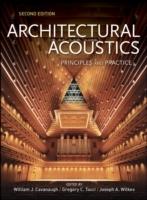ARCHITECTURAL ACOUSTICS. PRINCIPLES AND PRACTICE. 2ªED

Autor/es
- EAN: 9780470190524
- ISBN: 978-0-470-19052-4
- Editorial: JOHN WILEY & SONS, INC.
- Año de la edición: 2009
- Encuadernación: Cartoné
- Medidas: 21 X 28 cm.
- Páginas: 352
- Materias:
instalaciones
acústica, ruido
Stock en Librería. Envío en 24/48 horas
pvp 130,00 €
Get the leading guide to acoustics for architects, engineers, and interior designers. A widely recognized, comprehensive reference to acoustic principles for all concerned with the built environment, "Architectural Acoustics, Second Edition" provides design professionals with up-to-date information on basic concepts, acoustical materials, and technologies for controlling wanted or unwanted sound within and around buildings. Written by a team of internationally recognized experts and experienced consultants, this second edition covers fundamental acoustic principles, design criteria, acoustical materials, control strategies, and methods for a wide variety of building types, including educational, healthcare, recreational, residential, commercial, industrial, and transportation facilities. Particular attention is given to places for listening and performance such as theaters, churches, concert and recital halls, outdoor arenas, classrooms, multiuse auditoria, libraries, music practice and rehearsal rooms, recording and broadcast studios, sports venues, home theaters, and other spaces that people meet to communicate and enjoy performance. Updated throughout, this edition features: new information on acoustical standards and guidelines for sustainable building design; additional, richly detailed case studies demonstrating real-world applications, including the acclaimed Walt Disney Concert Hall and many other building types; nearly 200 photos and illustrations that further elucidate specific principles, applications, and techniques; new developments in sound reinforcement and audio visual systems and their integration in room design; and, progress in research and future directions in acoustical modeling. With fundamental conceptual understanding of basic acoustical principles provided by "Architectural Acoustics, Second Edition", building designers can confidently create aesthetically and aurally pleasing spaces, while avoiding problems that could be very costly, if not impossible, to solve later.

